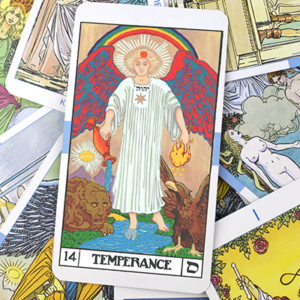The Story of Jesus’ Temptations, Reverend Ann Davies
Taken from The Meditational Ascent on the Tree of Livingness, Lesson 38. Printed in the Zenith News Notes No 126, December 2019.
Introduction: Understanding the Temptations of Jesus
The following is the story of Jesus’ temptations in the wilderness offers deep spiritual insights that resonate with our modern struggles. Each temptation represents a powerful lesson about the challenges we face on the path of spiritual growth. In this article, we explore these temptations through the lens of the 25th Path of Samekh, revealing their relevance to our own lives. By reflecting on the tests of security, power, and vanity, we can gain a deeper understanding of how to navigate the distractions and illusions that pull us away from our higher purpose. Through Jesus’ responses, we are reminded to seek balance, maintain humility, and always align our actions with the greater good.

The First Temptation: The Test of Security
In Luke 4 we read: ‘And Jesus … was led by the Spirit into the wilderness, being forty days tempted of the devil. And in those days, he did eat nothing: and when they were ended, he afterward hungered. And the devil said unto him, If, thou be the Son of God, command this stone that it be made bread. And Jesus answered him, saying, It is written, that man shall not live by bread alone, but by every word of God.’
This is the first temptation. Though it has many levels and facets of meaning, as has all true scripture, right now we will confine our interpretation to that which relates to the work of the 25th Path of Samekh.
Jesus was subjected to intense hunger and then challenged to use His professed spiritual powers to do something about assuaging it. This relates to the testing of the spiritual goals we profess to have against the tides of the present rather complex forms of the ancient concern for having enough to eat.
Throughout long eons and many of your earlier lives, hunger, poverty and deprivation were a necessary part of human unfoldment; necessary to get us out of a state of inertia into action with the outer environment. Wrestling with the problems of survival helped develop objective consciousness and the faculties of mind on the lower planes.
The present insecurity and yearning to have enough of this world’s good have their roots in this ancient ‘forty days of hunger.’ Our modern society has elaborated it into the present anxieties which require far more in the way of tangible assets in order to feel secure than just enough to eat.
This out-of-proportion need for security should be seen as a possible drain on your attention, your imagery and your activities which, if you could rest secure in the ‘exhaustless riches of … Limitless Substance,’ might be attention, imagery and activity free to be utilised for spiritual unfoldment.
Thus, the first temptation refers to this tendency in all of us to use most of our energies in trying to assuage the seemingly insatiable hunger for security – insatiable because it is sought in the wrong place. Relative to your work in this Path, it has to do with the need for an honest re-evaluation of your apportionment of time and attention according to your professed aspirations.
Reevaluating Our Pursuit of Security
Just how much of your attention, effort and time do you give to satisfying this need for financial security? How secure do you need to be in things? Be alert to the rationalisations of the lower mind. It might tell you, for instance, that you just want to have enough security so that you won’t have to think about making a living any more and will then be able to give all your attention to spiritual unfoldment. Beware! On that level and in that direction, you will never find it.
“Man shall not live by bread alone, but by every Word of God.”
— Jesus’ response to the first temptation, emphasising the need for spiritual sustenance.
Remember, however, the tests are subtle. Jesus’ answer was, It is written that man does not live by bread alone, but by every Word of God. He did not say that bread was not necessary. He said it was not the only thing necessary. Here we see the need for fine discrimination. Security in Eternal Supply is not to be used as an excuse for shirking the responsibility for making a living. Nor it is meant to reinforce the present popular reject of civilisation to see the simpler and so-called more spiritual life of past generations.
The answer is never backward! Those who are deluded by the idea that the less complex societies of the past were more spiritual should realise it as an attempt to escape the responsibilities of the world circumstances your Higher Self brought you into. If you attempt to withdraw from the pressures of civilisation because they seem unspiritual to you, then you are leaving that civilisation in the hands of those you consider less capable than yourself, are you not? Is that not just as much self-deluded rationalisation as the idea of concentrating on making money so you can eventually be free to follow the spiritual life?
Jesus’ answer included the idea that man lived not by bread alone, but by every Word of God. This should be understood by aspirants as a reference to the formative power of the Word. We want to assuage hunger, not just for ourselves, but for all of humanity. In order to do this the power of the Word – deliberate creative thought – must be utilised. You who know something of thought-form building must begin the work by giving strength to idea-forms of plenteous supply, security and courage.
The Second Temptation: The Test of Power
The second temptation of Jesus in Luke 4: ‘And the devil, taking him up into a high mountain, showed unto him all the kingdoms of the world in a moment of time. And the devil said unto him, All this power will I give thee, and the glory of them; for this is delivered unto; and to whomsoever I will, I give it. If thou therefore worship me, all shall be thine.’ And Jesus answered … Get thee behind me satan for it is written, Thou shalt worship the Lord thy God, and Him only shalt thou serve.
The second temptation refers to the test of power! If you are sufficiently resistant to separative temptations. The devil represents the exhilaration and satisfaction the separative self feels when discovering this ability to influence others and to bring things about by use of the focused will. This test of power comes to us many times and in many ways. Remember that the 25th Path is associated with fiery aspiration and persistence. Failure must not deter you!
Watch for signs in yourself of exhilaration in influencing others and remember your vow of looking upon every circumstance of your life as a particular dealing of God with your soul. Say with Jesus, Get thee behind me satan! For satisfaction in wielding powers that give us an advantage over others is a worshipping of the devil, it is a serving of the lower separative nature and not a serving of the God within.
Reach to the Angel in all that you do and you will be guided all the way.
Reach to the Angel in all that you do and you will be guided all the way.
Reverend Ann Davies
Resisting the Allure of Personal Power
The third and final temptation. ‘And he brought him to Jerusalem, and set him on a pinnacle of the temple and said unto him, If thou be the Son of God, cast thyself down from hence: For it is written, He shall give his angels charge over thee, to keep thee: And in their hands they shall bear thee up, lest … thou dash thy foot against a stone.’ And Jesus answering said … It is said, Thou shalt not tempt the Lord thy God.
A taste for power can become an addiction, and so can vanity which shows forth as spiritual pride. This final temptation has to do with the danger of ‘falling in love’ with your own spiritual image of yourself and becoming addicted to adoration, admiration and even worship from others.
Jesus’ answer refers to this idea of ‘showing off’ our spirituality; of attempting to usurp the lover and power that flows through us from the Father, to impress others with our superiority. Remember, it is only the little ‘I’ that is pleased by such verifications. The Higher Self within has no such need.
With temptations there is a need for fine distinction. We do need to grasp the impersonal source of love just as we need to grasp the impersonal source of all qualities; but this does not mean that all personal giving and receiving of love is in error.
The Dangers of Spiritual Vanity
When knowledge of your Real Self becomes an overshadowing presence in all that you do, then the joys of personal preference can be expressed without any error. When you are no longer deluded then feelings of personal love can be directed in ways that are in perfect harmony with your vow to be nothing but a servant to the One Life.
I will look upon every circumstance of my life as a particular dealing of God with my soul. This vow suggests a continuous evaluation of your personal life from the vantage point of your highest spiritual goal. That goal becomes the yardstick by which you measure the relative importance of things. It is your Angel, your Guide! You invoke it by remembering it! Everything you do can be appraised and rated in relation to that High Purpose. It is in this way you get things into right proportion in your life.
Living with a Higher Purpose
Whatever you do should be considered in the light of its benefit to the whole of humanity.
Read more here by Reverend Ann Davies: The Magic of Light versus Evil Influences: A Lecture by Rev Ann Davies
More about Reverend Ann Davies: Who is Ann Davis?
